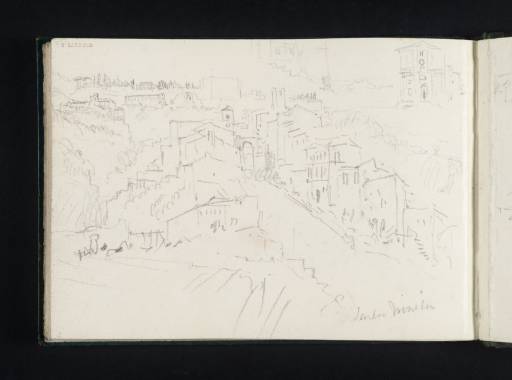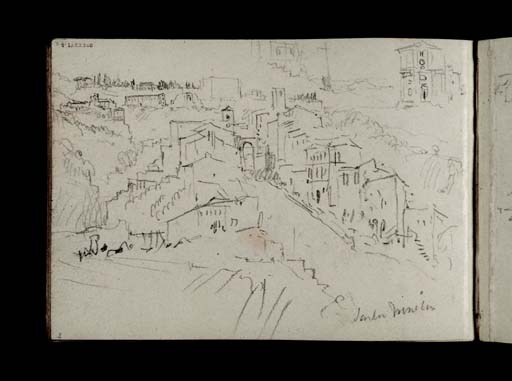Joseph Mallord William Turner Caprarola, from the South 1828
Image 1 of 2
Joseph Mallord William Turner,
Caprarola, from the South
1828
Folio 7 Recto:
Caprarola, from the South 1828
D21777
Turner Bequest CCXXXVI 7
Turner Bequest CCXXXVI 7
Pencil on white wove paper, 125 x 171 mm
Inscribed in pencil by Turner ‘Santa Trinita’ towards bottom right
Inscribed in blue ink by John Ruskin ‘7’ bottom left, upside down, and ‘173’ top left, upside down
Stamped in black ‘CCXXXVI 7’ top left, upside down
Inscribed in pencil by Turner ‘Santa Trinita’ towards bottom right
Inscribed in blue ink by John Ruskin ‘7’ bottom left, upside down, and ‘173’ top left, upside down
Stamped in black ‘CCXXXVI 7’ top left, upside down
Accepted by the nation as part of the Turner Bequest 1856
References
1909
A.J. Finberg, A Complete Inventory of the Drawings of the Turner Bequest, London 1909, vol.II, p.723, CCXXXVI 7, as ‘Do. [ditto: Town on hill] “Santa Trinita.”’.
1984
Cecilia Powell, ‘Turner on Classic Ground: His Visits to Central and Southern Italy and Related Paintings and Drawings’, unpublished Ph.D thesis, Courtauld Institute of Art, University of London 1984, p.436.
As identified by the Turner scholars Cecilia Powell and Roland Courtot, this panoramic view depicts the town of Caprarola in Viterbo.1 Inverted relative to the sketchbook’s foliation, it shows the steep slopes densely clustered with buildings. They lead towards the Palazzo Farnese, a Renaissance palace overlooking the town, outlined here at the top of the page. The street shown here is likely the present-day Via Filippo Nicolai, formerly known as the Via Dritta, designed in the sixteenth century by the architect Giacomo Barozzi da Vignola, who also designed the palace.2 The arch at the centre is presumably one of the two bridges designed by Vignola. The topography becomes more loosely defined towards foreground. Turner’s annotation ‘Santa Trinita’ likely refers to the nearby Church of San Marco, also known as the Santissima Trinità, which lies at the foot of the Via Dritta.
Turner’s vantage point for this view was near the Church of San Marco, facing north-west towards the Palazzo Farnese.3 A section of the palace’s façade is detailed separately in the top-right corner, to the left of which is distant Monte Soratte on the horizon. Caprarola appears in a dozen works in the present sketchbook; see under folio 4 verso (D21772) for an extended commentary and a list of relevant works.
Hannah Kaspar
December 2024
Powell 1984, p.436; Roland Courtot, ‘12. Vers Rome: “Carnet de Viterbe et Ronciglione” (TB CCXXXVI)’, Carnets de voyage de Turner, accessed 15 July 2024, https://carnetswt.hypotheses.org/2312 .
‘The Straight Way to Caprarola’, Caprarola.Com, accessed 19 July 2024, https://www.caprarola.com/palazzo-farnese/la-via-dritta.html .
‘Palazzo Farnese’, Visit Caprarola, accessed 15 July 2024, https://visitcaprarola.it/en/luoghi-da-visitare/edifici-storici/palazzo-farnese/ .
How to cite
Hannah Kaspar, ‘Caprarola, from the South 1828’, catalogue entry, December 2024, in David Blayney Brown (ed.), J.M.W. Turner: Sketchbooks, Drawings and Watercolours, Tate Research Publication, February 2025, https://www


